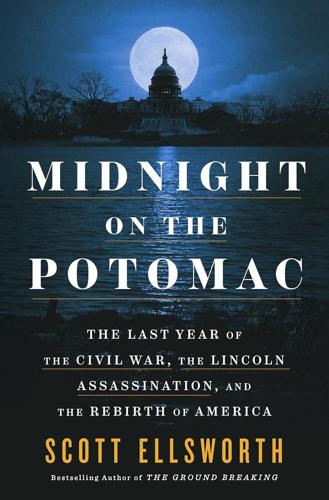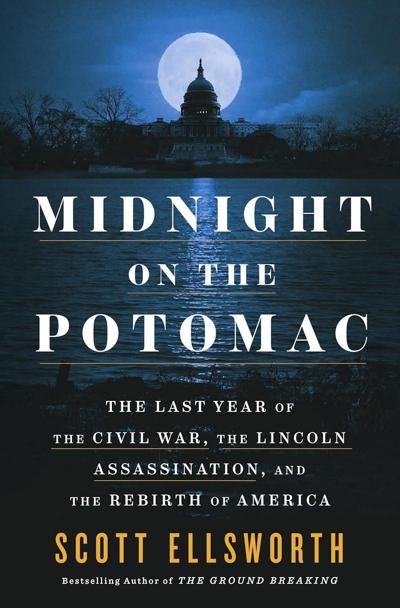According to those who keep track of such things, at least 60,000 books have been published about the Civil War.
Some of them try to be comprehensive, starting with the origin and the ills of slavery and moving through the actual battlefields on to the effects of Reconstruction and beyond. Others concentrate on certain aspects — the firing on Fort Sumter, individual battles and the generals who were in charge, the fateful Good Friday at Ford’s Theatre that ended the life of Abraham Lincoln, the plot hatched by cohorts of John Wilkes Booth and many, many more.
With “Midnight on the Potomac,” historian Scott Ellsworth adds to the list with a hybrid, sampling events and personalities here and there, from those that are best known to some that only the most devoted Civil War buffs might find familiar. For Ellsworth, as he relates in the book’s acknowledgements, inspiration for this latest entry into chronicles of the conflict started with a volume he got as a child — “The Golden Book of the Civil War,” which he read on a family road trip.
People are also reading…
He notes that as a student at Robert E. Lee Elementary School in Oklahoma, he already knew some things about the war. “But ‘The Golden Book of the Civil War’ lifted my interest to a whole new elevation, and before we made it back to Tulsa the night before school started, I had successfully convinced my folks to make side trips to the national battlefields at both Gettysburg and Antietam.”
For Ellsworth — who once worked as a historian at the Smithsonian Institution — such interest and devotion have been a lifelong pursuit. “Midnight on the Potomac” is faithful to his attempt to provide a broad-based look at the war. But his tendency to veer toward language that is overly dramatic — or melodramatic — sometimes undercuts his approach. “This is a book about how we almost lost our country,” he writes in an opening note. “For twelve precarious months in 1864 and 1865, the fate of the United States of America lay in the balance.”
That portentous voice appears frequently in how Ellsworth tells his story. Not too many pages go by before he devotes a paragraph or three to describing in detail a situation or event that appears to have a particular effect, then shifts gears and direction to a new perspective.
After describing Union setbacks in the summer of 1864, for example, he states:
“Lincoln, it appeared was finished.
“And, as it turned out, if not in one way, then in another.”
Describing a peaceful, pleasant Fourth of July in 1864, with fireworks lighting up a cloudless sky in the District of Columbia, he adds a cautionary note:
“The city was about to be attacked.”
And when he introduces Booth not as the little-known actor he is sometimes described as but as a 19th century Shakespearean superstar, Ellsworth intones:
“Only there was another side to John Wilkes Booth as well.”
That’s not to say “Midnight on the Potomac” lacks graceful, even inspiring language. Describing activity by newly freed Blacks in Georgia as Sherman led his march to the sea, Ellsworth writes of their finding joy and inspiration in their new liberty alongside the soldiers who were fighting to preserve the Union:
“For as the twin columns of blue-coated troops and those of the formerly enslaved trekked mile after mile through the pine-wooded heart of Georgia, a season of miracles was at hand. Generations of African Americans had freed themselves from the iron shackles and rancid breath of slavery, while thousands of battle-toughened farmers and mechanics from the shores of New England, the hills of Pennsylvania, and the prairies of Illinois had walked with them.”
And he adds that despite the blood that was shed and the battles that were won, the end of slavery remained a hard-fought battle. “Freedom,” he concludes, “wasn’t quite so free after all.”
Should you add “Midnight on the Potomac” to your Civil War reading list? Whether your knowledge and interest matches Ellsworth’s richness of detail or is far more casual, there are bound to be facts and scenes and interpretations that will stir a wide swath of readers, no matter what their level. It’s a worthwhile addition to the ever-growing canon.












